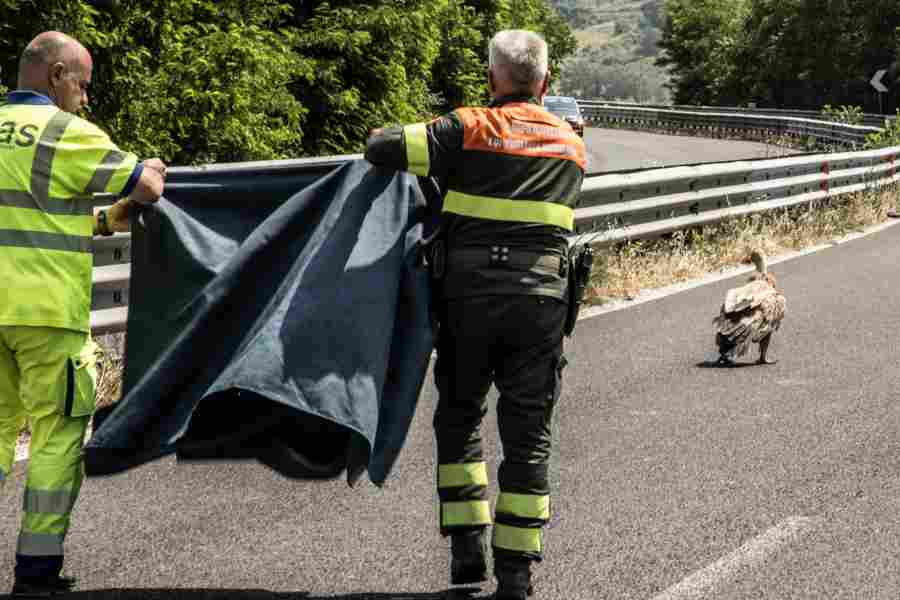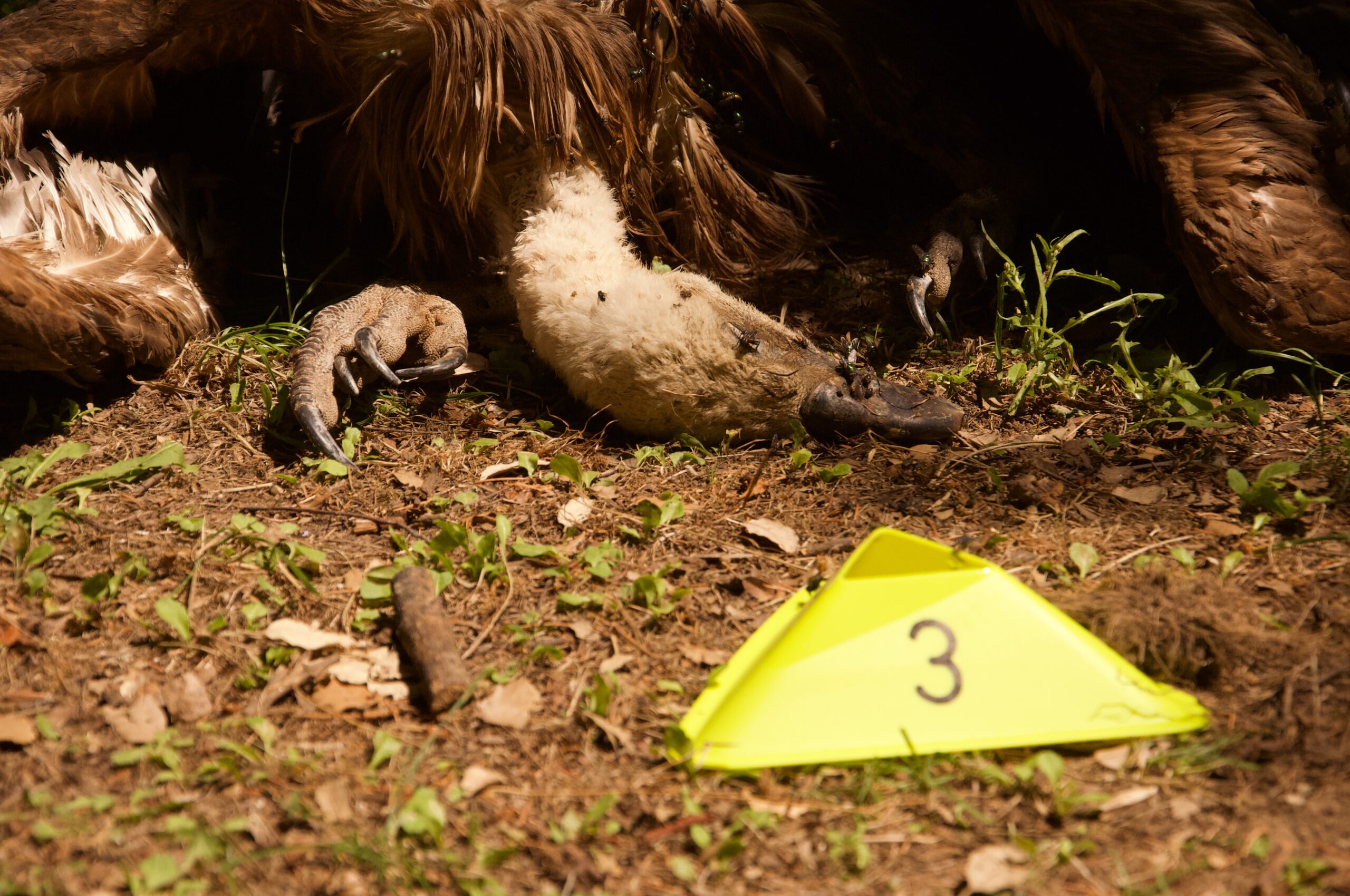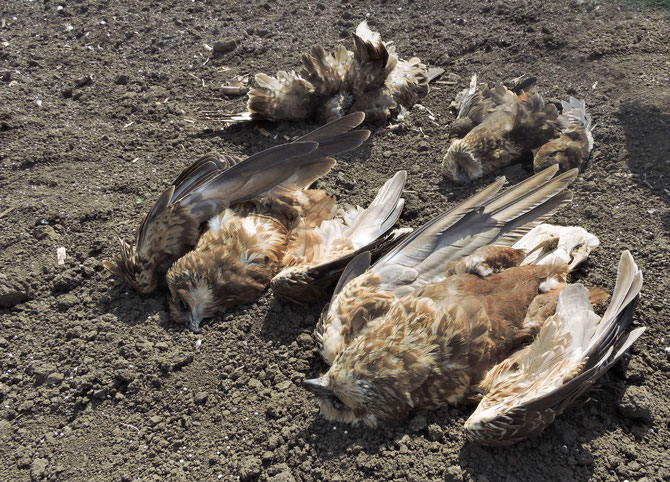
Accurate data and knowledge are vital to implement targeted conservation actions. To tackle illegal wildlife poisoning, one of the most critical threats vultures face as well as other wildlife, our colleagues from the Bird Protection and Study Society of Serbia have been investigating the scope of this issue in the country for the past year within the framework of our Balkan Anti Poisoning (BAPP) Small Grants Programme. This is an essential output, as understanding the extent of illegal wildlife poisoning is necessary to save vultures and other birds in Serbia.
Collecting data on animal poisonings

The focus of anti-poison efforts in Serbia, supported by the BAPP Small Grant Programme this past year and carried out by our partners from Bird Protection and Study Society of Serbia, has been the collection of data relevant to animal poisoning and monitoring of the scope of this illegal practice in order to determinate the black spots for the poisoning of wild birds in the country. Collecting data about poisoning connected incidents of wild and domestic animals. This collected data includes both data about every type of poisoning accident, no matter if it is a dead poisoned animal (domestic or wildlife), as well as data about poison baits found. Data was collected through social media networks and web portals, as well as from traditional media (TV, radio, newspapers). A particular part of valuable information comes from relevant state institutions. This information was acquired by means of an official request for information of public importance from relevant governmental institutions, such as the Institute for Nature Conservation of Serbia, the Ministry of Environmental Protection and others. Eventually, the hotspots where the most illegal poisoning had occurred and were recorded during the 2019/2020 period were defined.
What are the most prominent types of poisoning incidents?
Intentional poisoning by the use of poison baits was the most dominant type of poisoning recorded and poisoning incidents documented during the implementation of the BAPP Small Grant Programme in Serbia. These incidents usually occurred due to human conflict with stray and feral dogs. About 80% of the total 62 registered poisoning and suspected poisoning incidents could be connected to this practice, with the death toll of domestic dogs poisoned from July 2019/March 2020 in Serbia being 243. Other poisoning incidents relate to human-wildlife conflict, especially conflict with large carnivores (mostly jackals and foxes). A total of 12 jackals and five foxes were found poisoned during this period. According to the collected data, there were no cases of deliberate poisoning of wild birds in Serbia during this period. Birds were usually victims of secondary poisoning. A total of 24 wild birds, including 1 White-tailed Eagle, 4 Common Buzzards, 2 Marsh Harriers were found poisoned. There was only one vulture-related incident, where a juvenile Griffon Vulture was suspected of poisoning, but the conducted necropsy revealed no indications of poisoning, and hence no further toxicological analysis was commissioned by the relevant authorities. Poison baits, without any animal casualties were found in 14 separate incidents.
When and where do poisoning incidents occur?
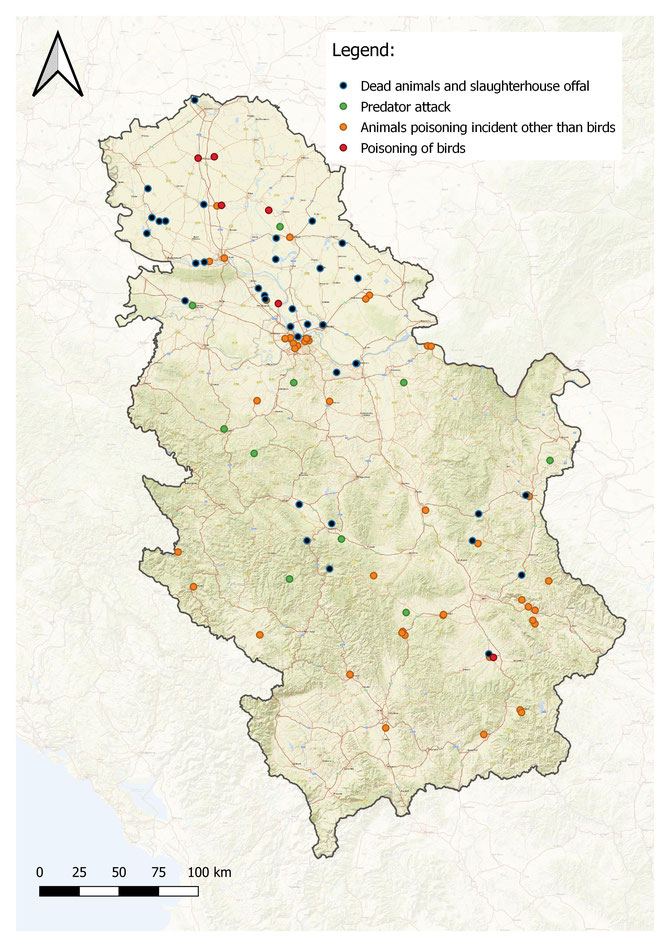
The most common time for poisoning incidents in Serbia is in the early spring, and wintertime. What is certain is that most of the poisoning is registered in Vojvodina province in northern Serbia probably because of the large base of members and supporters that our partners from BPSSS have established there. Toxicological analysis of poisoned animals were conducted in only two cases, one paid by a private citizen for analysis of his poisoned dog and the second which related to a poisoning incident involving several strictly protected species that we have already reported on, clearly indicating that there is gap in the capacity of responsible governmental institutions. The toxicological analysis conducted in both cases revealed that the substance used was Carbofuran.
Poisoning is still a major threat in Serbia
According to the findings of our partners from Serbia, the illegal poisoning of animals is still a very common practice, so far practised mainly in the northern parts of the country, but in reality, it is most likely widespread throughout the country. If we take into account that only about 10-20 % of the poisoning incidents are ever recorded, it is clearly indicative that this illegal practice is one of the most significant threatening factors for the country’s wildlife and that more active measures need to be taken from all stakeholders relevant for combating this environmental issue.
The Balkan Anti-Poisoning Project Small Grants Programme
The Balkan Anti-Poisoning Project Small Grants Programme is the first time we at the Vulture Conservation Foundation have run a grant programme, and with this we aim to reinforce national capacities within relevant governmental authorities and conservation NGOs from six countries (Albania, Bosnia and Herzegovina, Croatia, Greece, North Macedonia and Serbia) of the Balkan Peninsula. This work will support those organisations to improve the skills and capabilities in the detection and mitigation of poisoning incidents through the implementation of previously developed National Roadmaps and Strategies. More specifically, through these small grants we endeavor to secure the implementation of priority anti-poisoning actions listed in the National Anti-Poisoning Road-maps/Strategies, strengthen the capacities of relevant national governmental institutions in combating the illegal use of poison baits, improve the enforcement of relevant legislation and attract other funding opportunities for implementation of large-scale anti-poisoning projects in the region. Through the support of the MAVA Foundation, we managed to dedicate a budget of €60.000 for these small grants.
Balkan Anti-Poisoning Project
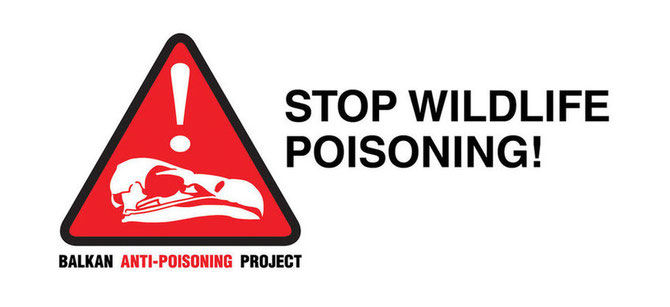
The Balkan Anti-Poisoning Project is a cross-border initiative bringing together wildlife conservation organisations, governmental agencies and other stakeholder such as; hunting associations, farmers and scientists, in six Balkan countries to tackle illegal wildlife poisoning.
Funded by the Mava Foundation we aim to secure real and continued engagement of the relevant national governmental authorities in the Balkan region against illegal wildlife poisoning and increase their capacity to counteract it and working together to take positive steps to protect vultures.
The Balkan Anti-Poisoning Project is a partnership between us here at the Vulture Conservation Foundation and the Albanian Ornithological Society-AOS, Protection and Preservation of Natural Environment in Albania-PPNEA, Ornithological Society “Naše ptice”,Association BIOM, Hellenic Ornithological Society-HOS, Macedonian Ecological Society-MES and Društvo za zaštitu i proučavanje ptica Srbije.
The Balkan Anti-Poisoning Project also contributes directly into the implementation of the Vulture Multi-Species Action Plan by carrying out anti-poisoning actions in Albania, Bosnia and Herzegovina, Croatia, Greece, North Macedonia and Serbia, and is building on our work for the last decade in the Balkans through the Balkan Vulture Action Plan.



